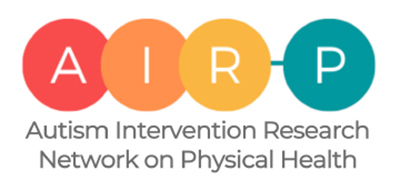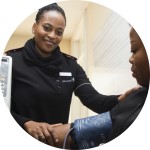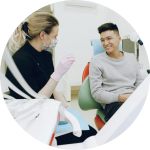Autism Intervention Research Network on Physical Health (AIR-P)

Purpose
The Autism Intervention Research Network on Physical Health (AIR-P) establishes and maintains an interdisciplinary, multicenter research network for scientific collaboration and infrastructure to increase the life expectancy and quality of life for autistic individuals, particularly for underserved and vulnerable populations. The purpose of the AIR-P is to support innovative life course intervention research that promotes optimal health and well-being of autistic individuals across the lifespan.
Objectives
| IDENTIFY | TRANSLATE | IMPLEMENT | TRAIN |
|
Identify the needs, experiences, and priorities of autistic individuals and their families and the current gaps in research, practice, and policy. |
Facilitate the transition of intervention research to policy and practice by disseminating findings across a sectors for diverse audiences. | Implement multi-site data collection through the AIR-P Network and create a centralized data repository. | Facilitate and support the training and mentorship of diverse early career investigators in physical health and autism. |
Areas of Focus
 |
Primary Care Services and Quality |  |
Community-based Lifestyle Interventions |
 |
Gender, Sexuality and Reproductive Health |  |
Health Systems and Services |
 |
 |
Genetics |
Approach
AIR-P is guided by an Autistic Researcher Review Board (ARRB) which has been established to serve as an innovative model for how autism researchers and autistic voices can effectively work together. The ARRB consists of a group of autistic researchers at various points in our careers as academics, lecturers, and consultants. This gives us the unique perspective as both scientists and lived-experience experts, with which to assess the merit of the proposed research projects and their relevance to improving the lives of autistic people.
Partnership
The Association of University Centers on Disabilities (AUCD) serves a key role in managing the overall functioning of the AIR-P Network. With AUCD's network of 143 interdisciplinary centers that bring together both university and community resources to achieve meaningful change, the AIR-P Network is poised to be highly successful in this partnership, delivering stakeholder-driven research and health promotion to autistic individuals and their families.
Opportunities to Engage
Research Scholars & Pilot and Feasibility Funding Program
Provides funding and mentorship for independent investigators at all career stages
- Annual RFP for 4-10 awards ranging from $10k-$50k
- Supports preliminary research and data collection to help secure external funding
- Transdisciplinary collaboration encouraged
- CRE faculty may have opportunity to serve as mentors to Scholars
- Coordinated by and awarded through UCLA
Infrastructure for Collaborative Research (ICR)
This online database supports:
- Submission of proposals for research packages
- Preliminary research and data collection
- Multisite research collaboration
- Download of research packages for local implementation
- Access to data from AIR-P studies for secondary analysis
Collaborating Research Entities (CRE)
Annual infrastructure funding to participate in AIR-P Research Network activities
- Participate in meetings and workgroups
- Develop concepts and protocols for research
- Implement studies and clinical trials
- Enhance research training and mentorship of early career researchers
- Translate findings to practice and training
Dissemination of Findings
- Research Day: twice annually at Autism CARES and AUCD Conference
- Pediatrics journal: annual supplement with 12-15 original research articles
- Monthly webinar series
For additional opportunities or questions about the above list, please contact [email protected].
Locations
National Coordinating Center
Partners
- Association of University Centers on Disabilities
- AJ Drexel Autism Institute
- Kaiser Permanente Northern California
- Mathematica
Collaborating Research Entities (CREs)
- Carolina Institute for Developmental Disabilities at University of North Carolina at Chapel Hill
- Center for Human Development at University of Alaska Anchorage
- Center on Human Development and Disability at University of Washington
- Indiana Institute on Disability and Community at Indiana University
- Institute on Community Integration at University of Minnesota
- Institute on Disability and Human Development at University of Illinois Chicago
- JFK Partners at University of Colorado Anschutz Medical Campus
- Kansas University Center on Developmental Disabilities at University of Kansas
- Kennedy Krieger Institute
- Mailman Center for Child Development at University of Miami Miller School of Medicine
- Rose F. Kennedy Children's Evaluation & Rehabilitation Center Center at the Children's Hospital at Montefiore
- Sonoran Center for Excellence in Disabilities at University of Arizona
- The Boggs Center on Developmental Disabilities at Rutgers Robert Wood Johnson Medical School
- University of California Davis MIND Institute
- University of Tennessee Health Science Center, Center on Developmental Disabilities
This project is supported by the Health Resources and Services Administration (HRSA) of the US Department of Health and Human Services (HHS) under award UT2MC39440, the Autism Intervention Research Network on Physical Health. The information, content, and/or conclusions are those of the author and should not be construed as the official position of, nor should any endorsements be inferred by HRSA, HHS, or the US Government.








